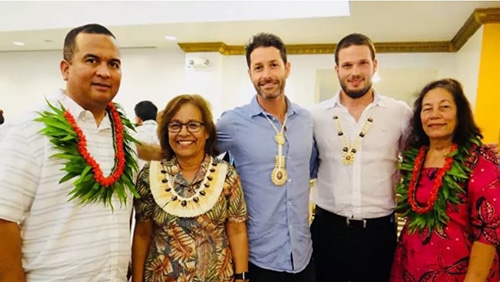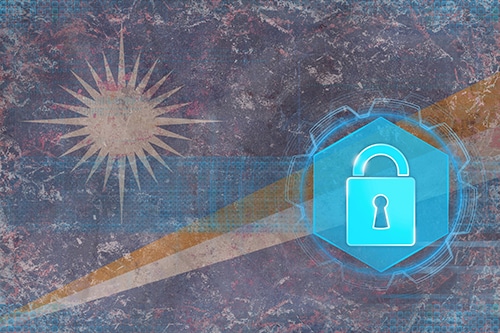On March 21st, a huge milestone was achieved in the fight to legitimize Cryptocurrencies and Blockchain technology.
The Marshall Islands, a tiny nation in the middle of the Pacific Ocean, approved a bill to develop its own cryptocurrency called Sovereign (SOV) in partnership with Israeli Tech Company Neema.
The nation of 53,000 people, with a GDP of just $183 million does not have its own currency and instead uses US dollars.
SOV Overview
The team, led by CEO Barak Ben Ezer has been pursuing this opportunity for over a year. Ezer studied the regulatory landscape and discovered that there was one significant hurdle preventing Bitcoin and other crypto currencies from being considered legal money.
According to the IRS, the definition of money is ‘the legal tender of a sovereign state’. At the current moment, Bitcoin is not considered a currency but a commodity.
Its volatile nature has caused regulators to propose that it be subject to capital gains tax and treated like stocks.
In order to comply with the IRS and push crypto to mainstream adoption, Ezer and his team spent the past year and a half looking for sovereign nations (nations that are members of the UN) that did not have their own currency.
They finally settled on the Marshall Islands. As Ezer put it:
I was looking for a country that would be open to the idea of adopting a cryptocurrency as legal tender. I ruled out countries like Sweden and went to the smallest countries in the world. The smaller the country, the easier it will be for it to adopt such a currency. I added another parameter – a country that does not have its own currency. That’s how I got to the Marshall Islands.
This plan is not cheap.
 Neema Team with Marshall Island Representatives – Image via Haaretz
Neema Team with Marshall Island Representatives – Image via HaaretzThe team is spending tens of millions of dollars to develop the technology needed for the nations people and their local businesses to begin accepting the currency.
In successfully convincing the Marshall Islands to adopt SOV as their currency, financial institutions such as banks and Visa now also have to accept SOV as legal money for transacting.
Neema now plans to help the Marshall Islands start fundraising by launching an Initial monetary offering (IMO) where for the first time, a sovereign nation is issuing its own currency to the public without any central bank. 24 million tokens will be supplied during the IMO.
It’s no surprise that a team of forward-thinking tech entrepreneurs would want to accomplish a feat like this. However one has to wonder why the Marshall Islands chose to go along with this plan, especially knowing how volatile the crypto market is, and how Blockchain technology is still in its early stages and struggling with scalability issues.
A quick background on the Islands history gives a lot of evidence for why they decided to make this move.
A Tiny Nation Under The Thumb of The US
In 1944, the US took control over the Marshall Islands by defeating its Japanese occupants. Shortly after, they entered into an agreement with the UN Security Council to administer much of Micronesia, including the Marshall Islands, as the Trust Territory of the Pacific Islands.
 Castle Bravo Nuclear Test. Source: wikipedia.org
Castle Bravo Nuclear Test. Source: wikipedia.orgFor the next few decades, the Marshall Islands were treated very much as a conquered territory, with little to no regard for the well being of its local citizens.
The US military began testing nuclear missiles around the Island, launching as many as 67 tests between 1946 and 1958.
The largest test (called ‘Castle Bravo’) was a hydrogen bomb about 1,000 times the size of Hiroshima, and resulted in hundreds of Marshallese residents evacuating from their homes.
To compensate, the United States granted the Islands their Independence in 1986, along with a $150million settlement, however this pales in comparison to the actual damages caused. According to wikipedia:
Over the years, just one of over 60 islands was cleaned by the US government, and the inhabitants are still waiting for the 2 billion dollars in compensation assessed by the Nuclear Claims Tribunal. Many of the islanders and their descendants still live in exile since much of the islands are contaminated with high levels of radiation since the time of the U.S. nuclear tests till this day
The Marshall Islands have filed complaints to the UN, which for the most part has fallen on deaf ears.
20% of the money raised from the launch of SOV will go to the fund that handles the victims of these nuclear tests.
Climate Change
The rising of sea levels caused by global warming has been especially catastrophic for the Island.
A new climate study funded by the US Defense Department concluded that between the 2030s and 2060s, these islands would likely become uninhabitable because of increased damage to fresh water and infrastructure from ocean flooding.
Currently, the Islands only recourse is to make a request to the US Government for aid.
According to Ezer, 10% of the funds raised from SOV’s IMO will go to a fund that supports the use of green energy and other climate change efforts. 50 percent of the money will go to the State Budget Support Fund, and the last 20% will be distributed directly to citizens.
Implication for Other Small Nations
The Marshall Islands is just one of many small nations that are independent in name, but still burdened by the incredible weight of the larger, more dominant nations that once controlled them through conquest.
By relying on a currency that is not theirs, these nations are in essence still conquered territories, unable to exercise their own monetary policy and in constant need of support from larger countries.
Much like the Blockchain empowers individuals to become their own bank, a national crypto currency empowers the Marshall Islands, Palau, and other small countries to achieve fiscal autonomy.
What Are the Risks?
Adopting a crypto currency as the legal tender of a sovereign state does not come without its risks.
Volatility is still a major issue plaguing the crypto currency market. Although an IMO will help the country raise a significant amount of money in the short term ($30 million), the lack of a stable currency could reek havoc on an economy where 53,000 people will need to pay for everyday goods and services with a common understanding of how much each item costs.
 Image via Fotolia
Image via FotoliaEzer and his team will have to figure out how to protect the currency from being influenced by market speculation. It’s not clear whether SOV coins will be listed on an exchange, or even who is allowed to purchase them when the IMO is launched.
If the coins are available for anyone in the world to acquire, then it’s easy to see how outside speculators (AKA crypto whales) could buy up large portions of the currency to just sit on it and wait for the value to go up.
This would stifle economic progress and productivity for an entire nation.
Fortunately, it looks like the underlying technology of the new cryptocurrency will be a public protocol called "Yokwe." The protocol links users accounts to real government-verified identities, removing the Know-your-customer and financial crime issues that could create the nightmare scenarios mentioned above.
Furthermore, the US, who recently banned its citizens from purchasing Venezuela’s ‘Petro’ cryptocurrency and restricts US investors from launching or participating in ICO’s may not approve.
Lastly, the argument that financial institutions such as banks and Visa now have to accept SOV as legal money is only partially true. As a country with only 53,000 people and a GDP of $183 million, the Marshall Islands simply doesn’t enough leverage for Banks to change their position on what type of money they accept.
Banks could simply choose to not accept SOV, leaving The Marshall Islands in a far worse position.
Conclusion
The Marshall Islands are making a bold step in embracing cryptocurrencies as their national money. The country has been victim to unwarranted damages caused by 12 years of nuclear testing by the United States, of which reparations have still not been paid in full.
Global warming also threatens to render their country uninhabitable unless they can immediately begin funding green energy projects to fight back.
Ultimately the Marshall Islands will serve as a great example for other smaller nations seeking their own fiscal autonomy, and an excellent case study of how Blockchain technology can not only benefit the business world, but also support national, political and humanitarian interests.



